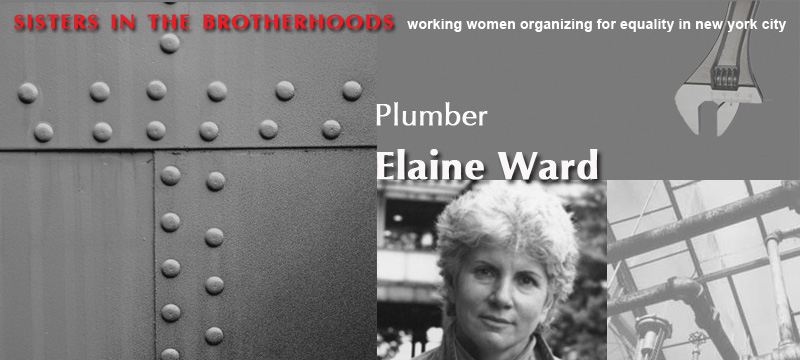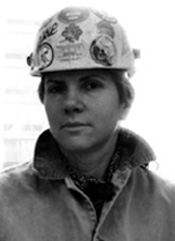 |
||||||
|
||||||
|
Elaine Ward grew up in Connecticut and attended the University of Minnesota, where she earned a bachelor’s degree in fine arts in 1978. Back on the East Coast, she worked a series of part-time, low-paying jobs until she reached her thirties and decided she wanted more lucrative employment. She moved to New York City, and in fall 1985 she met a woman carpenter who encouraged her to apply for an apprenticeship in the plumbers' union. She was lured by the promise of higher pay and the knowledge that card-carrying union members with paid-up dues could work with locals around the country. “That was a hot-button for me, the idea of working and traveling,” 00she recalled. Ward went to Nontraditional Employment for Women to get help preparing for the tests and interview, which she passed. Three and half months elapsed before she was put to work on a plumbing job; the rest of her classmates, all male, had been hired by plumbing contractors and were getting paid for the days they were in school. Ward kept calling the union hall regularly until she received an order to report to work in June 1986 at First Avenue and 38th Street. Throughout her apprenticeship she made every effort to learn all she could about the trade, the industry, and the union. In addition to her apprenticeship, she attended Mechanics Institute courses and received a design certificate. In spring 1990 Ward completed her apprenticeship. Of the three women who entered the apprenticeship program in 1985, Ward was the only one who graduated. Her belief that things would improve on the job now that she had a journeyman’s card was quickly dashed. Determined to fight discrimination and harassment, she testified in March 1990 at a public hearing before New York City Commission on Human Rights. For the next two years Ward explored every possible avenue to challenge the system but quickly learned that she was being blacklisted. In 1991 she worked a total of five months; in 1992 she did not work in New York City at all. In October 1992 Ward took to the road, becoming a “boomer,” a worker who travels to worksites around the country. During the next five years she worked out of 21 union halls in 15 states she’d never visited before. She acquired a range of new skills, mastered her trade, and learned how to navigate the boomer network. After years of traveling, Ward returned to New York City, earned a master plumbing license, and set up a shop as an independent contractor. Her company, Isis Plumbing, established in spring 2001, is one of the few woman-owned plumbing firms in the city. In her oral history Ward describes the consequences of blacklisting, her repeated efforts to improve a flawed system, and the rewards of being a journeyman boomer on the road. |
|||||
| ||||||
Copyright 2012 Jane LaTour/Talking History Photo of Elaine Ward by Gary Schoichet |
||||||
